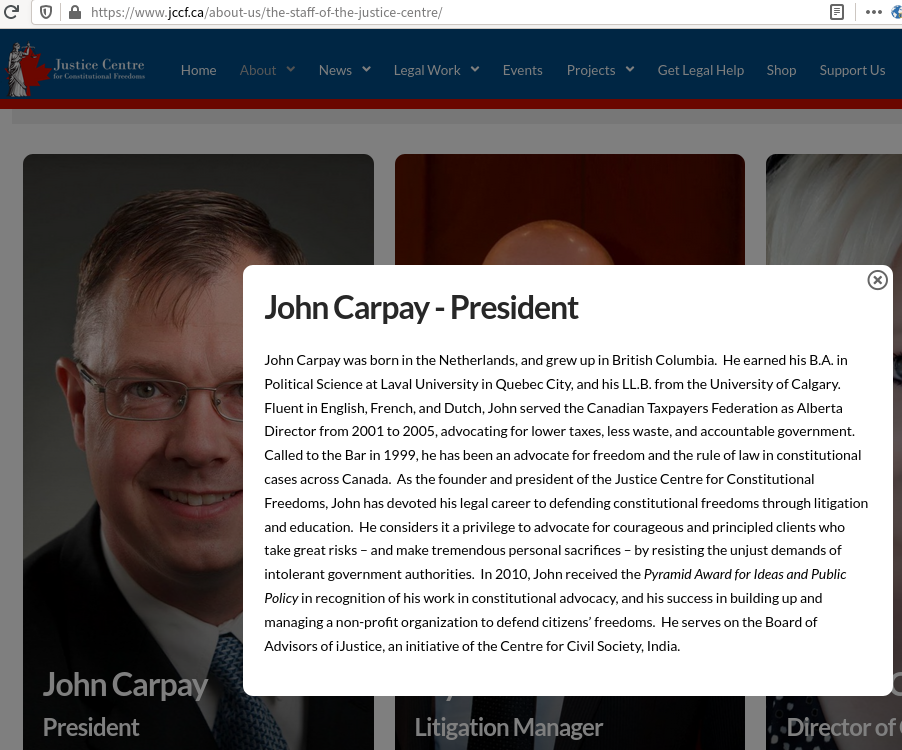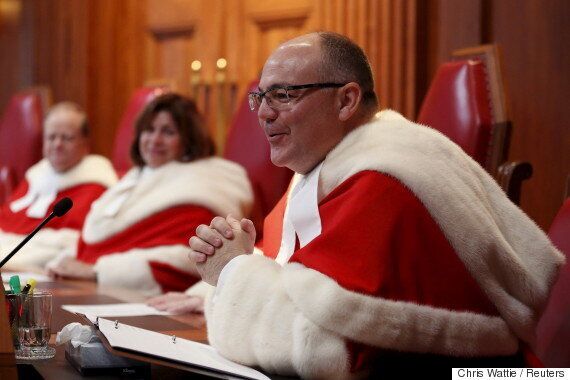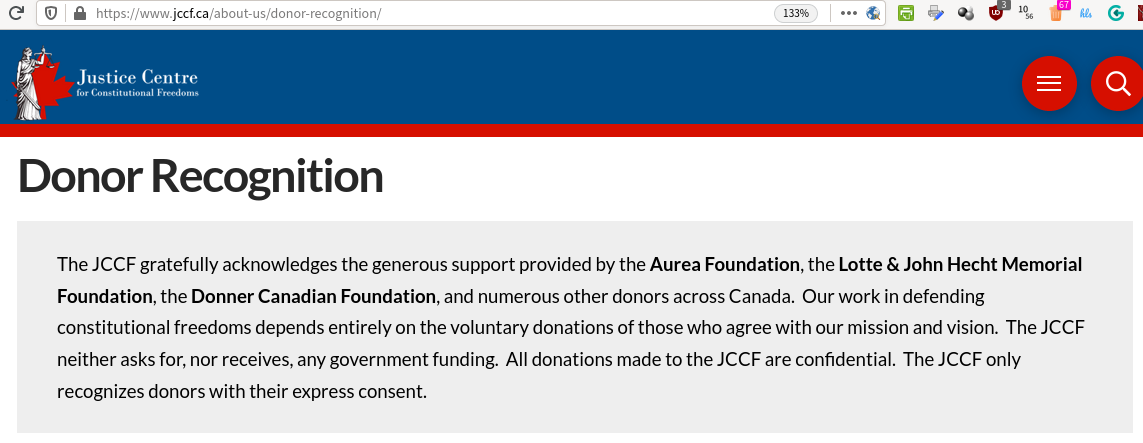Justice Centre for Constitutional Freedoms
SOURCE: Wikipedia, captured 2020-08-04
Abbreviation: JCCF
Formation: 2010
Founder: John Carpay
Registration no.: 817174865-RR0001
Legal status: Charitable organization
Purpose: Legal advocacy
Headquarters: Calgary, Alberta, Canada
President: John Carpay
Website: JCCF.ca
Funding:
-
The Justice Centre for Constitutional Freedoms [Justice Centre for Constitutional Freedoms] gratefully acknowledges the generous support provided by the Aurea Foundation, the Lotte & John Hecht Memorial Foundation, the Donner Canadian Foundation, and numerous other donors across Canada. Our work in defending constitutional freedoms depends entirely on the voluntary donations of those who agree with our mission and vision. The JCCF neither asks for, nor receives, any government funding. All donations made to the JCCF are confidential. The JCCF only recognizes donors with their express consent.
-
[2019-09-03]: Death of David Koch a reminder of who bankrolls Canada's right

President of the Justice Centre for Constitutional Freedoms, John Carpay.
[Image source. Click image to open in new window.]

Justice Centre for Constitutional Freedoms President John Carpay.
John Carpay was born in the Netherlands, and grew up in British Columbia. He earned his B.A. in Political Science at Laval University in Quebec City, and his LL.B. from the University of Calgary. Fluent in English, French, and Dutch, John served the Canadian Taxpayers Federation as Alberta Director from 2001 to 2005, advocating for lower taxes, less waste, and accountable government. Called to the Bar in 1999, he has been an advocate for freedom and the rule of law in constitutional cases across Canada.
As the Founder and President of the Justice Centre for Constitutional Freedoms, John Carpay has devoted his legal career to defending constitutional freedoms through litigation and education. He considers it a privilege to advocate for courageous and principled clients who take great risks -- and make tremendous personal sacrifices -- by resisting the unjust demands of intolerant government authorities. In 2010, John received the Pyramid Award for Ideas and Public Policy in recognition of his work in constitutional advocacy, and his success in building up and managing a non-profit organization to defend citizens' freedoms. He serves on the Board of Advisors of iJustice, an initiative of the Centre for Civil Society, India.
See also:
[2017-05-04]: B.C. Christian University's Homophobia Has Nothing To Do With Piety. The upcoming Supreme Court of Canada appeal about whether Trinity Western University has the right to establish a law school that bans gays and lesbians promises to be one of the most influential human rights decisions in the history of the court. The debate is a depressing reminder of how reviled LGBT people still are among certain segments of society.
Though this case seems drawn from a previous century, there is nevertheless reason for LGBT advocates to be concerned. Stephen Harper's last pick to the Supreme Court of Canada, Justice Russell Brown, sat on the Advisory Council of the Justice Centre for Constitutional Freedoms (JCCF), which is one of the intervenors in the TWU case, as well as the Canadian Constitution Foundation, another group which has lobbied publicly on TWU's behalf.
Most JCCF cases involve advocating on behalf of pro-life protesters, people (including one of the most influential and notorious Islamophobes in the United States) who denigrate Islam; organizations and individuals whose religious beliefs "compel" them to discriminate against LGBT people; and Christians who wish to proselytize publicly. The JCCF has acted as an intervenor in the TWU case, and, though he resigned his position upon his ascension to the bench, Brown's volunteer advocacy on behalf of (and membership in) an organization so hostile to gay and lesbian equality ought to worry LGBT people whose rights are at stake at the Supreme Court in the TWU case.
Brown served on the JCCF Advisory Council alongside another lawyer who represented the Seventh Day Adventist Church in the TWU case, and a current JCCF lawyer, who was on the board of directors concurrently. Shockingly, Justice Brown's endorsement of the JCCF, its mission, and John Carpay, its leader, "mistakenly" remained on the website until July 2015, while he was a sitting judge in Alberta and while the TWU case was being litigated in Ontario and B.C.
While Brown's integrity is not in question, his previous political affiliation with so many individuals involved in litigating the TWU case is evidence of a conflict of interest. He also served on the advisory board of the Canadian Constitution Foundation, another hard-right organization which has published articles supporting TWU's LGBT ban. He served on the council with John Carpay, who is also the current leader of the JCCF.

Justice Russell Brown speaks during his welcoming ceremony at the Supreme Court of Canada in Ottawa Oct. 6, 2015.
[Image source. Click image to open in new window.]
The Justice Centre for Constitutional Freedoms (JCCF) is a Canadian conservative legal advocacy organization specializing in Canadian constitutional law, specifically in the Canadian Charter of Rights and Freedoms. The organization describes itself as non-partisan but JCCF has partnered with several right-wing backers in the United States.
History
Based in Calgary, Alberta, the organization was founded in 2010 by John Carpay, a former Alberta Provincial Director of the Canadian Taxpayers Federation, and a former candidate of the federal Reform Party and provincial Wildrose Party who later joined the United Conservative Party.
Major court cases
The Justice Centre has argued cases before the Court of Queen's Bench of Alberta, Court of Queen's Bench of Manitoba, and Ontario Superior Court of Justice.
Allen v Alberta
Allen v Alberta was a legal challenge to the Government of Alberta's monopoly on health insurance within the province (as it applies to seeking out-of-province treatment) by Darcy Allen, who had elected to pay $77,000 to undergo surgery for his chronic back pain in Montana rather than wait for treatment in Alberta. The case closely mirrored the 2005 case of Chaoulli v Quebec (AG) where the Supreme Court of Canada ruled that a government monopoly on health insurance, when combined with extremely long wait lists before care could be provided, was a violation of the individual's right to life, liberty, and security of the person, all of which are guaranteed under section 7 of the Canadian Charter of Rights and Freedoms.
The Court of Queen's Bench ruled against Allen on 31 March 2014.
Wilson v University of Calgary
A campus pro-life club caused controversy at the University of Calgary when they erected a graphic display as part of a "Genocide Awareness Project," which illustrated results of an abortion along with historical atrocities such as the Holocaust and the Rwandan genocide. This case was the ninth time in which the group had put on the display. University security staff requested that the students turn the graphic portions of their display inward, away from passers-by. When the eight students running the display refused to comply, the university initiated non-academic misconduct proceedings against them. The school's Vice-Provost ruled that the actions constituted misconduct and penalized the students with a formal written warning.
This penalty was appealed to the University of Calgary's Board of Governors, which refused to hear the appeal and upheld the penalty. The students then requested that the Court of Queen's Bench order the Board of Governors to allow an appeal. The court ruled in April 2014 that the Board of Governors' decision not to hear the appeal of the students "lacked justification, transparency and intelligibility" and ordered the board to hear the students' appeal.
2019 license plate challenges
In 2019, the Justice Centre represented three individuals in cases related to license plates that were revoked due to complaints -- two in Manitoba, one in Nova Scotia. John Carpay stated that without such action, "we move closer to a society where people have a legal right not to feel offended which means that there's less freedom of expression." The Canadian Civil Liberties Association expressed supported the plaintiffs in these cases.
The Manitoba plates were "ASIMIL8", issued to a Star Trek fan, and "NDN CAR", issued to a First Nations man in reference to the song NDN Kar by Keith Secola. In October 2019, the Court of Queen's Bench of Manitoba upheld the decision of Manitoba Public Insurance to take back the "ASIMIL8" because of the association of that word with the forced assimilation of Indigenous people. An agreement was reached between the owner and Manitoba Public Insurance to return the "NDN CAR" plate to its owner.
The Nova Scotia plate was "GRABHER", which caused controversy as the surname of the car's driver, Lorne Grabher, is similar to the phrase "grab her." A decision of the Nova Scotia Supreme Court upheld the province's decision to revoke the plate.
Yaniv v. Various Waxing Salons
Main article: British Columbia Human Rights Tribunal § Yaniv v. Various Waxing Salons
In 2019, the Justice Centre represented five estheticians in Yaniv v. Various Waxing Salons before the British Columbia Human Rights Tribunal. The complainant, a trans woman, filed discrimination complaints against 13 waxing salons alleging that they refused to provide Brazilian waxes to her because she is transgender. In response to the complaints, several of the estheticians said that they lacked the required training to wax male genitalia, or that they were not comfortable doing so for religious or personal reasons. The Tribunal ruled against Yaniv and ordered her to pay $6,000 in restitution split equally among three of the service providers. The ruling was critical of Yaniv, stating that she "targeted small businesses, manufactured the conditions for a human rights complaint, and then leveraged that complaint to pursue a financial settlement from parties who were unsophisticated and unlikely to mount a proper defence," and admonished her for using human rights law as a "weapon" to "penalize" marginalized women with a racial animus and for filing in such a volume for financial gain. On January 7, 2020, the Justice Centre announced it was representing another salon in an additional complaint filed by Yaniv in early October 2019.
Intervenor status
The Justice Centre has acted as an intervenor in several court cases involving questions of constitutional rights; those involving evangelical Christians, anti-abortion groups, or other groups that have felt their religious values have been compromised as well as intervening in cases concerning the protection of freedom of speech, and advocating for parents who do not want their minor children subjected to gender reassignment surgery and cross sex hormones which cause permanent sterility and physical harm. By acting as an intervenor, the Justice Centre is able to have their position on the legal questions brought before the court without actually being the official legal counsel for the individuals and organizations on whose behalf the Justice Centre was intervening.
Trinity Western University
See also: Trinity Western University § Faculty of Law accreditation lawsuits
In 2012 the private evangelical school Trinity Western University (TWU) completed a proposal to establish its own law school. Several groups objected to the establishment of this law school because of TWU's Community Covenant Agreement, a code of conduct, which is mandatory for all students to agree to. Unlike codes of conduct at many universities throughout Canada, however, TWU's Community Covenant Agreement requires explicit acceptance of an evangelical ethical framework including bans on gossip, vulgar language, pornography, and sexual conduct "that violates the sacredness of marriage between a man and a woman."
As a result of opposition to the Community Covenant Agreement the memberships of the Law Society of Upper Canada (now the Law Society of Ontario), the Law Society of British Columbia, and the Nova Scotia Barristers' Society voted to not accredit the law school. This prevented graduates from being automatically admitted to practice law in those three provinces, though they were still able to apply for individual admission to the society after graduation.
The Justice Centre acted as an intervenor in the cases of Trinity Western University v Nova Scotia Barristers' Society (court ruled in favour of TWU), Trinity Western University v The Law Society of Upper Canada (court ruled in favour of LSUC), and Trinity Western University v Law Society of British Columbia (court ruled in favour of TWU).
Both the Ontario and BC rulings were appealed to the Supreme Court of Canada, with the Justice Centre intervening in both cases. On 15 June 2018 the Supreme Court ruled in favour of the law societies in 7-2 decisions for both Trinity Western University v Law Society of Upper Canada and Law Society of British Columbia v Trinity Western University. The majority decisions said that TWU's Community Covenant would deter LGBT students from attending the proposed law school and that equal access to legal education, diversity in the legal profession and preventing harm to LGBT students were in the public interest.
Campus Freedom Index
The Justice Centre publishes a yearly report authored by John Carpay, lawyers and staff, that rates Canadian universities and students' unions on their adherence to the principles of freedom of speech. The annual report gives grades to universities and students' unions based on Justice Centre's opinion of the strength of their principles and procedures regarding freedom of speech as well as actions regarding freedom of speech.
The Cape Breton University Students' Union criticized the Justice Centre's rankings as being politically motivated and using old information after it was docked for a ban on religious and political groups approaching people. Officials at Ryerson University defended itself against its low scores noting that the Justice Centre rankings fail to take into account legal anti-hate speech provisions under federal and provincial laws.
Writer Lindsay Shepherd, former Teaching Assistant at Sir-Wilfrid Laurier University joined the Justice Centre in 2019.
Endorsements
The endorsement section of the Justice Centre website lists seven individuals as representatives for Canadian think tanks. These are:
The other endorsements it lists are from Ezra Isaac Levant of The Rebel Media [now Rebel News], and Michael Taube, a former speechwriter for Stephen Harper.
Additional Reading
Neo-Nazi was a Guest at a Swanky Fundraising Dinner for a Right-Wing Charity That Tried to Dig Up Dirt on a Canadian Judge. Gala dinner was sponsored by Postmedia and featured speeches from Christie Blatchford, Barbara Kay and Jian Ghomeshi's lawyer.
A notorious neo-Nazi was among the guests at a controversial right-wing charity's gala fundraising dinner, rubbing elbows with a who's who of Canadian media personalities, high-powered lawyers and wealthy Toronto philanthropists.
The Justice Centre for Constitutional Freedoms, a charity that focuses on litigation and advocacy for social conservative causes, has recently faced intense scrutiny after hiring a private investigator to follow and surveil Manitoba's Chief Justice in a failed bid to catch the judge violating COVID-19 restrictions.
In a public statement, the Justice Centre's board of directors condemned the charity's executive director, John Carpay, who admitted hiring the private eye.
The Justice Centre, which is quietly funded by some of Canada's wealthiest people, pledged to conduct a "comprehensive review" of decision-making at the charity. Despite that pledge, the Justice Centre now has little to say about why a neo-Nazi was seated next to donors and VIPs at a $200 per plate fundraising dinner.
Hosted at Toronto's Eglinton Grand Theatre, the Justice Centre's June 2019 "George Jonas Freedom Award Dinner" was sponsored by Postmedia and featured the late National Post reporter Christie Blatchford and criminal attorney Marie Henein, who served as Jian Ghomeshi's lawyer, as keynote speakers. Other VIP guests spotted at the gala included Jon and Barbara Kay, the Toronto Sun's Brian Lilley and Anthony Furey, as well as filmmaker David Cronenberg.
Another gala attendee was Paul Fromm, who is a well-known neo-Nazi.
Earlier this year, Conservative leader Erin O’Toole took steps to expel one of his own Conservative MPs, Derek Sloan, after PressProgress reported Sloan had accepted a donation from Fromm.
Photos posted on Facebook by both the Justice Centre and Fromm show the neo-Nazi chatting with Blatchford at the event.
[ ... snip ... ]
[2021-07-19] These Rich and Powerful Elites Have Quietly Funded a Right-Wing Charity That Tried to Dig Up Dirt on a Canadian Judge. Meet a few of the wealthy Canadian philanthropists whose money helped fund the Justice Centre for Constitutional Freedoms
Additional Reading
Return to Persagen.com



